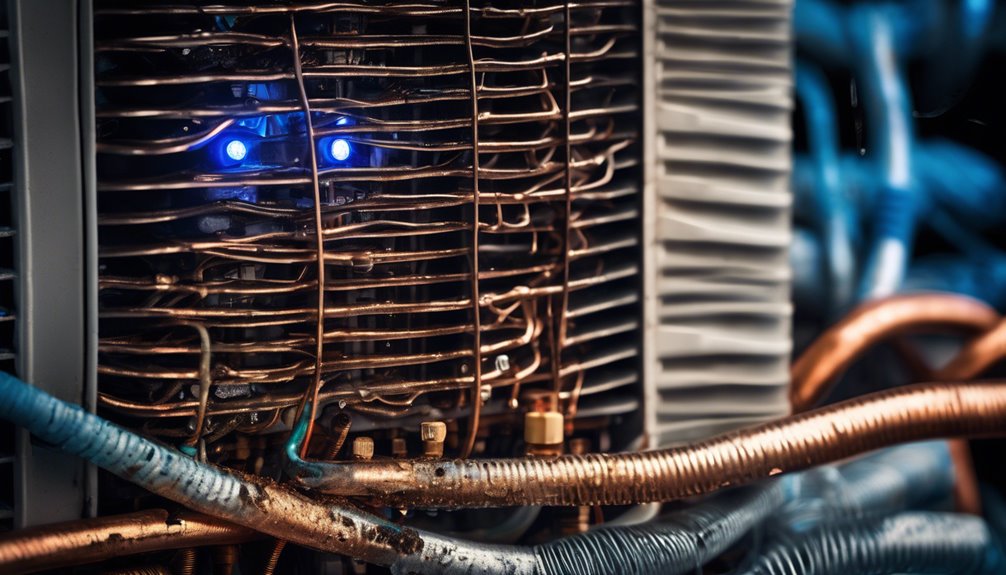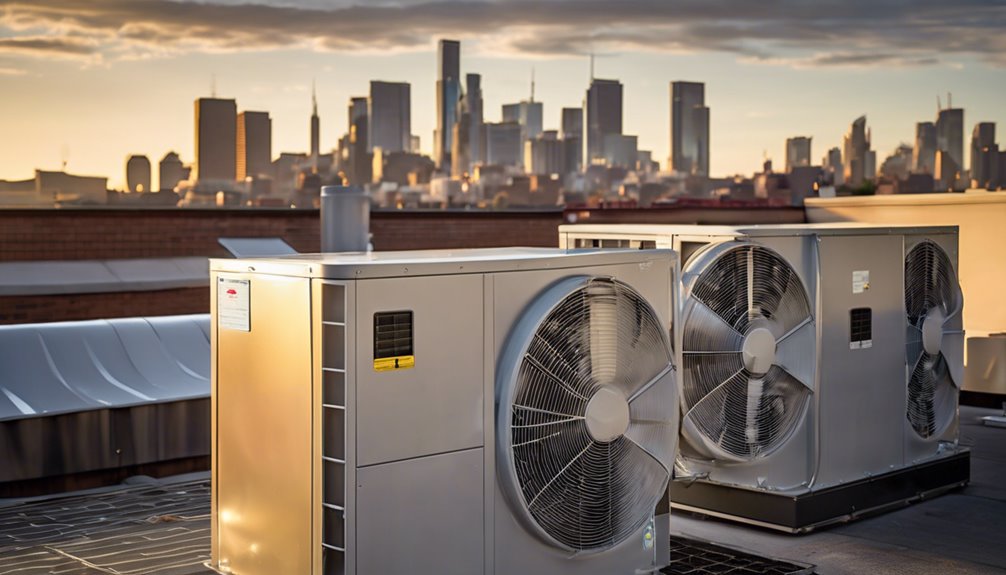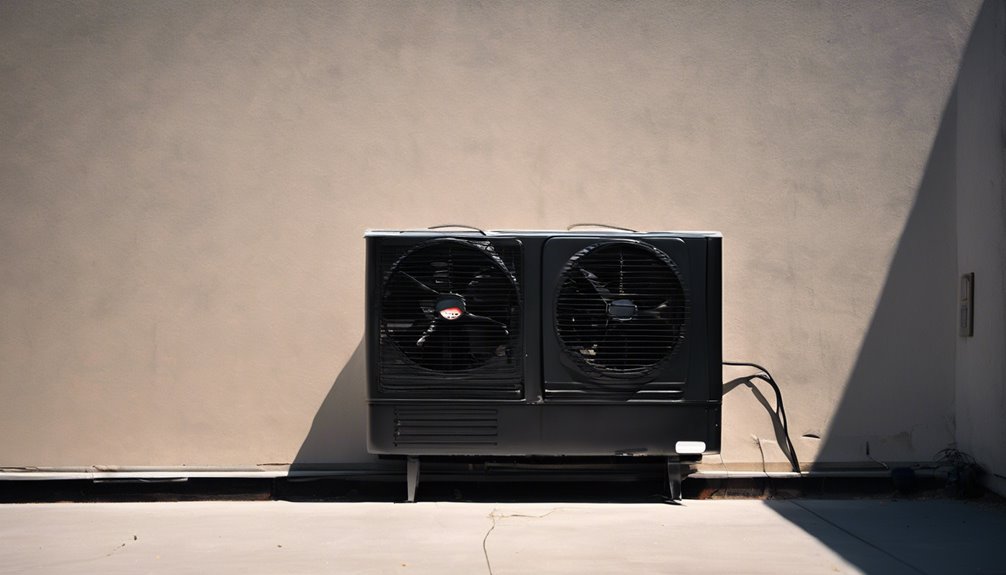You're not alone if your AC loses gas frequently. It's often due to underlying issues like leaks in the system, improper installation, worn or damaged seals, corrosion and rust, or overuse and neglect. These issues can cause refrigerant to escape, reducing your AC's efficiency. Identifying the root cause is key to preventing further gas losses. By understanding these common culprits, you'll be better equipped to tackle the problem head-on and get your AC running smoothly again – and there's more to learn about each of these factors that can help you do just that.
Key Takeaways
- Leaks in the system, from condenser coils to evaporator, can lead to frequent gas losses and require regular tracking and thorough inspections.
- Improper installation, including mounting errors and loose connections, can cause refrigerant leaks and system malfunction.
- Worn or damaged seals can allow refrigerant to escape, reducing the AC's efficiency, and require regular inspections and replacement.
- Corrosion and rust can cause refrigerant leaks by creating tiny holes in the AC's components, and can be prevented by keeping the exterior clean and dry.
- Overuse and neglect, resulting from excessive cooling and prolonged operation, can lead to refrigerant leaks and complete system failure.
Leaks in the System
When your air conditioner is blowing warm air, you might suspect that the refrigerant is leaking out.
This isn't just a hunch – it's a common issue that can lead to frequent gas losses. Leaks in the system are a major culprit, and they can occur anywhere, from the condenser coils to the evaporator.
Leaks in the system are a major culprit, leading to frequent gas losses and occurring anywhere from condenser coils to evaporator.
To identify the source of the leak, you'll need to conduct thorough system inspections. This involves checking for signs of refrigerant loss, such as ice buildup or hissing sounds.
You should also keep track of your refrigerant levels through regular tracking. By monitoring your system's performance and refrigerant levels, you can catch leaks early and prevent further gas losses.
Improper Installation
Improper installation is a common mistake that can cause your AC to lose gas. When you hire an inexperienced technician or DIY the installation, you're more likely to encounter mounting errors and loose connections. These mistakes can lead to refrigerant leaks, reducing your AC's performance and increasing your energy bills.
| Installation Error | Description | Effect on AC |
|---|---|---|
| Mounting errors | Incorrectly securing the AC unit | Vibration-induced leaks, reduced airflow |
| Loose connections | Failing to tighten fittings and hoses | Refrigerant leaks, system malfunction |
| Inadequate support | Not providing sufficient support for the AC | Vibration, reduced lifespan |
| Incorrect refrigerant charging | Over- or under-charging the system | Inefficient cooling, increased energy bills |
Make sure to hire a qualified technician to install your AC to avoid these common mistakes.
Worn or Damaged Seals
Worn or damaged seals can be a silent killer of your AC's performance.
Over time, seal material can deteriorate, allowing refrigerant to escape and reducing your AC's efficiency. You mightn't notice the issue at first, but it'll eventually lead to increased energy bills and a shorter system lifespan.
To prevent this, you should conduct regular seal inspections. Check for signs of wear, cracks, or brittleness around the seals.
If you find any damage, replace the seals immediately. Remember, seal inspection is crucial to maintaining your AC's performance and preventing gas loss.
Corrosion and Rust
Corrosion and rust can quietly sabotage your AC's performance, causing refrigerant leaks and reducing its efficiency.
You mightn't notice it at first, but over time, corrosion can eat away at your AC's components, creating tiny holes that allow refrigerant to escape. Acidic environments and moisture buildup can accelerate this process, making it essential to keep your AC's exterior clean and dry.
When corrosion sets in, it can lead to refrigerant leaks, which can cause your AC to lose its cooling power.
Overuse and Neglect
When you rely too heavily on your AC, it can lead to a breakdown in its performance, causing refrigerant leaks and reducing its efficiency.
You mightn't realize it, but excessive cooling and prolonged operation can put a significant strain on your AC's components. This can cause the system to work harder, leading to overheating and increased pressure, which can result in refrigerant leaks.
If you don't address this issue, it can lead to a complete system failure. Make sure to give your AC regular breaks and maintain it properly to prevent overuse and neglect.
Frequently Asked Questions
Can AC Gas Be Refilled Instead of Replaced?
You can consider a gas refill for your AC instead of replacement, but it's essential to identify the leak source first; then, you can explore recharge options, ensuring a successful refill that lasts.
How Long Does It Take for AC Gas to Leak Out?
You're wondering how long it takes for AC gas to leak out. The leakage rate depends on the unit's condition, but with an aging unit, you can expect the gas to escape faster, typically within a few months to a year, depending on the severity of the leak.
Can a Dirty Air Filter Cause AC Gas Loss?
You might wonder, can a dirty air filter cause AC gas loss? Yes, it can! A dirty filter reduces air circulation, decreasing filter efficiency, which can lead to increased pressure, potentially causing refrigerant leaks and gas loss over time.
Is It Normal for AC Gas to Decrease Over Time?
You'll likely notice your AC's gas levels decreasing over time due to natural degradation and seal deterioration, which is a normal process, but it's essential to check for leaks and maintain your system to minimize this loss.
Can Gas Leaks Be Detected by Smell or Sound?
You can try detecting gas leaks by smell or sound, but it's not always reliable. Instead, you should use gas sniffing devices or professional leak detection methods to identify potential issues and ensure accurate diagnosis.
Conclusion
You've probably asked yourself why your AC loses gas so frequently. The truth is, it's often a combination of factors. Leaks in the system, improper installation, worn or damaged seals, corrosion, and rust can all contribute to the problem. Add overuse and neglect to the mix, and you've got a recipe for disaster. By identifying and addressing these issues, you can prevent gas loss and keep your AC running smoothly.



